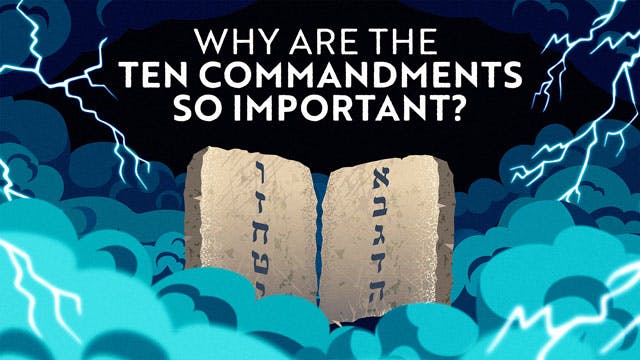At Aleph Beta, we’re captivated by how themes organically weave through the Torah’s stories, connecting seemingly unrelated narratives into a greater whole. Studying Torah by theme—rather than focusing on isolated verses or events—allows us to step back and witness how core values and ideas reappear across the text. A theme like Respect Before Love, for instance, doesn’t just show up in the Ten Commandments; it also shapes stories like Lot’s, Lavan’s, and Nadav and Avihu’s, each time revealing new depth and refining our understanding of the Torah’s message.
What makes these themes especially compelling is that they aren’t ideas we impose on the text; they emerge naturally, often catching us by surprise with unexpected patterns. By approaching the Torah with an open mind, we uncover themes that arise on their own, giving us fresh perspectives on what this sacred text is trying to convey.
In this section, we invite you to dive into these recurring themes and explore how they evolve across different stories. We’ve highlighted some of our favorite videos that capture these essential ideas, offering a lens through which Torah becomes not just a collection of stories but a unified exploration of life’s biggest questions. We hope you find inspiration here and, more than that, a deeper appreciation for Torah as an interconnected tapestry of divine wisdom.
Yibum
Yibum, or levirate marriage, is a fascinating theme woven throughout the Torah and Tanakh. Although it’s rarely practiced today—Jewish law generally replaces it with chalitza, a ritual that formally dissolves the obligation—it holds a meaningful place in biblical narratives.
Deuteronomy defines yibum specifically as a brother marrying his deceased brother’s widow, yet stories like the Book of Ruth expand the concept to include other relatives. This broader interpretation serves as a way to honor and carry forward the legacy of a deceased family member. Yibum isn’t merely a technical law; it’s a profound idea that appears in some of the Bible’s most important stories. So integral is this concept that some suggest it even reflects why God chose Abraham, establishing a foundation for Jewish values of loyalty, responsibility, and continuity.
While the sages limited its application in Jewish law, yibum’s underlying message still resonates. It underscores timeless values of kinship and moral responsibility—reminding us of the significance of family, legacy, and commitment across generations.

The Meaning of the Book of Ruth: Yibum, Redemption, and the Power of Kindness
Most people know the Book of Ruth as the story of Ruth’s unparalleled loyalty to her mother-in-law Naomi and Boaz’s kindness in redeeming Naomi’s land by marrying Ruth. But in this illuminating course, Rabbi Fohrman reveals that the story of Ruth goes far deeper. Through surprising connections to Adam, Noah, Abraham, and even the Tower of Babel, Rabbi Fohrman uncovers how Ruth’s story is really an expansion of the biblical theme of yibum—the tradition of redeeming family legacy after loss. Ruth’s unwavering faithfulness isn’t just to Naomi; it speaks to an ancient human kindness that honors the dead and uplifts the living through kindness, weaving a narrative that connects us all.
Part 1 of 5 • 11 min
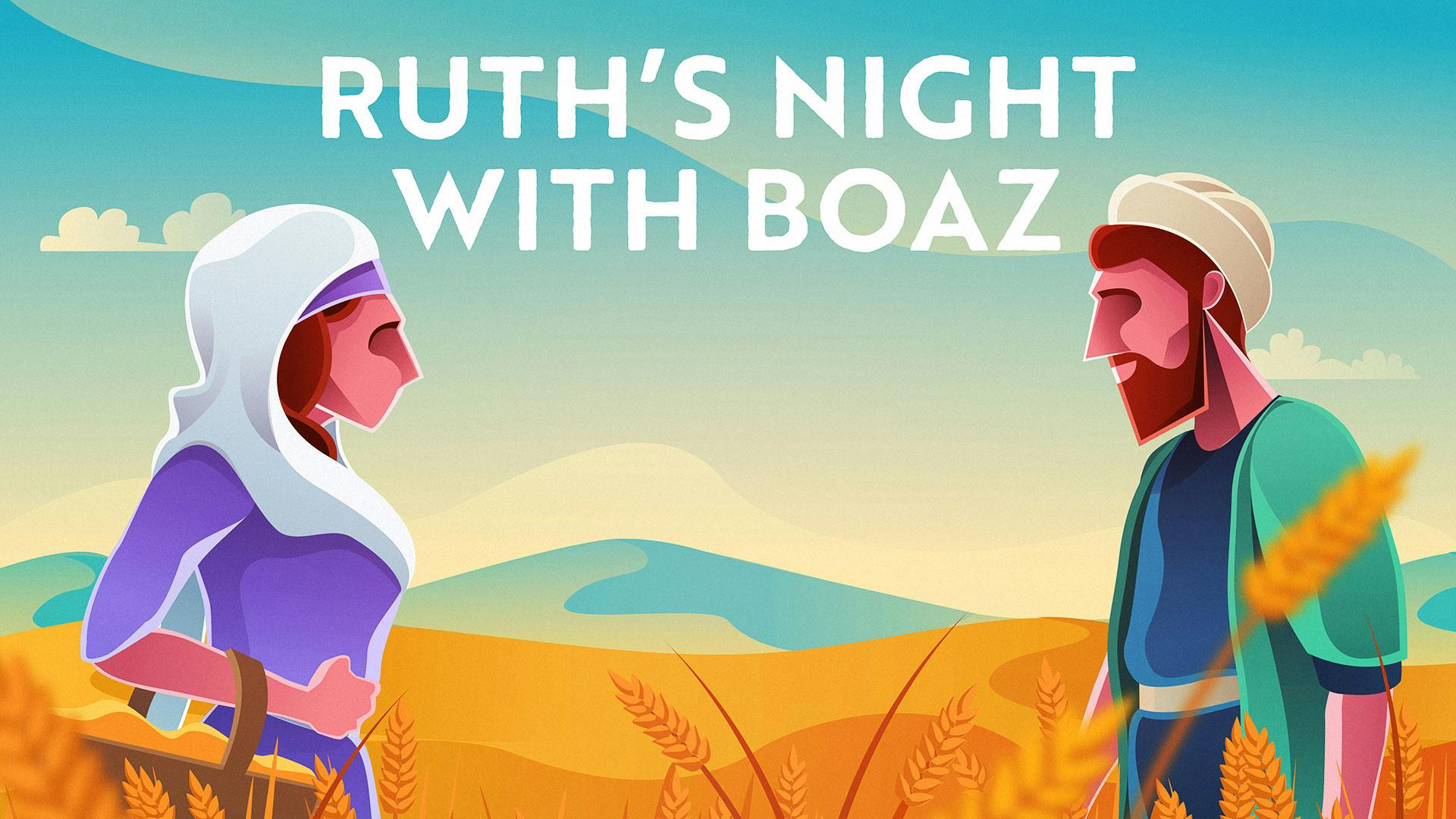
Did Ruth Seduce Boaz? A New Definition of Yibum and Kindness in the Book of Ruth
Are Ruth and Boaz truly biblical heroes? After all, the climax of their story is a night that seems to cross lines of seduction and impropriety—hardly what we might call virtuous. In this thought-provoking course, Rabbi Fohrman uncovers surprising links between Ruth’s bold actions and the stories of her and Boaz’s ancestors, connecting Ruth’s story to the uncomfortable tale of Lot’s daughters, as well as Tamar’s deception of Judah. Both stories reveal how yibum, an act meant to preserve family legacy, can go dangerously wrong when it’s forced or lacks true consent. Through Ruth’s relationship with Boaz, however, we witness a transformation in the meaning of yibum. While Ruth’s approach is audacious, she leaves Boaz’s choice in his own hands, bringing a new level of respect and integrity to this ancient tradition. Together, Ruth and Boaz reimagine yibum as an act not only of kindness, but one rooted in mutual respect and partnership.
Part 1 of 4 • 11 min

Yibum and Abraham’s Hidden Act of Heroism
Abraham is celebrated as the father of the Jewish people, the ultimate patriarch. Yet when the Torah first introduces him, it’s through a seemingly ordinary genealogy at the end of Parshat Noach. Why would the Torah introduce such a central figure in such a mundane way? And, perhaps more importantly, why was Abraham chosen by God in the first place? In this final lecture of the series, A Brief History of the World, Rabbi Fohrman uncovers a surprising answer: this genealogy may hint at an act of heroism by Abraham—yibum, stepping in to preserve the legacy of his deceased brother. This act, hidden within the family tree, may hold the key to why Abraham was chosen to shape a legacy of kindness for generations.
Part 1 of 11 • 57 min
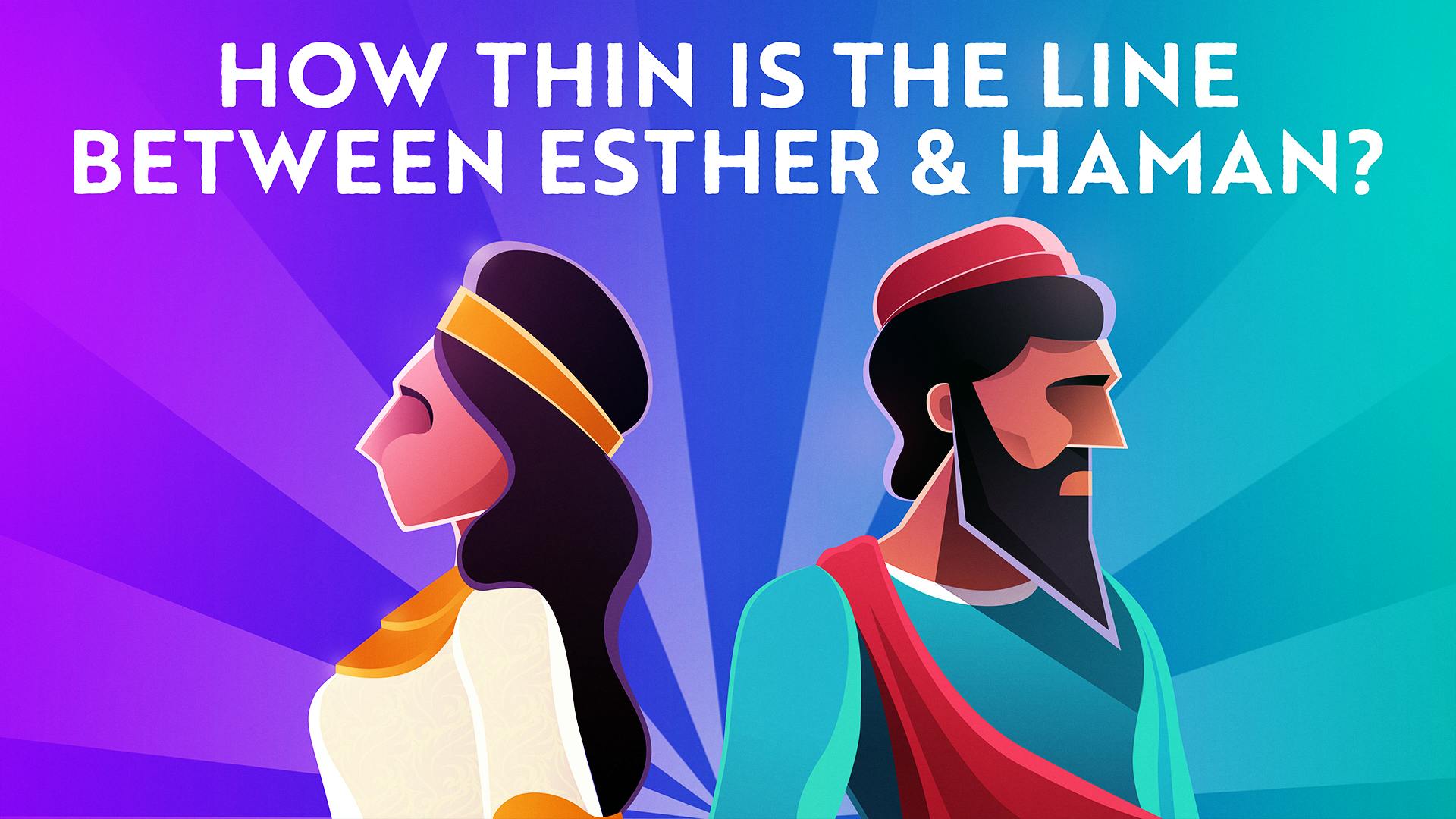
Yibum and Chalitza: The Thin Line Between Esther and Haman
In this two-part series, Rabbi Fohrman uncovers a hidden layer in the Purim story that might just change the way you see Esther and Mordechai’s heroism. In Part One, he reveals how the most climactic moment in the Megillah contains a surprising reference to the laws of yibum (levirate marriage) found in Devarim. Then, in Part Two, Rabbi Fohrman deepens these parallels, showing how Esther and Mordechai, descendants of Benjamin, take on a unique mission to save the Judeans—a bold, almost yibum-like act of preserving their people’s future. (And for a deeper dive into the connections between Mordechai and Esther and Judah and Benjamin, check out this animated course.) In stark contrast to Mordechai and Esther stands Haman, who is driven by self-interest, seeking only to promote his own name and legacy. Through these characters we see how the willingness to take on yibum responsibilities becomes the true measure of heroism and lasting success, inviting us to rethink the powerful message at the heart of the Purim story.
Part 1 of 2 • 1 hour, 5 min
Perils of Creativity (and Over-Processing)
While the ability to create and innovate is a defining characteristic of humanity, the Torah cautions against the potential pitfalls that come with this power. Unchecked creativity can lead to a sense of control and domination, distancing us from our connection to the divine source of all existence. Laws such as those governing Shabbat encourage us to pause, reflect, and appreciate the world around us, while dietary restrictions teach us the importance of boundaries in our actions. These narratives highlight the need for mindfulness and humility in our creative pursuits, reminding us that our role as creators is to nurture and elevate rather than to overwhelm or objectify the creation around us.

The Importance Of Shabbat In All Jewish Holidays
Through an unusual starting point—the Torah's laws in Parshat Emor about a newborn animal staying with its mother before it can be offered—Rabbi Fohrman uncovers the deeper, often-overlooked link between Shabbat and creativity. Shabbat, and the festivals, are more than just days of rest: it’s a paradigm for how we, as creators, must sometimes let go of our work to allow it—and ourselves—to simply be.
9 min
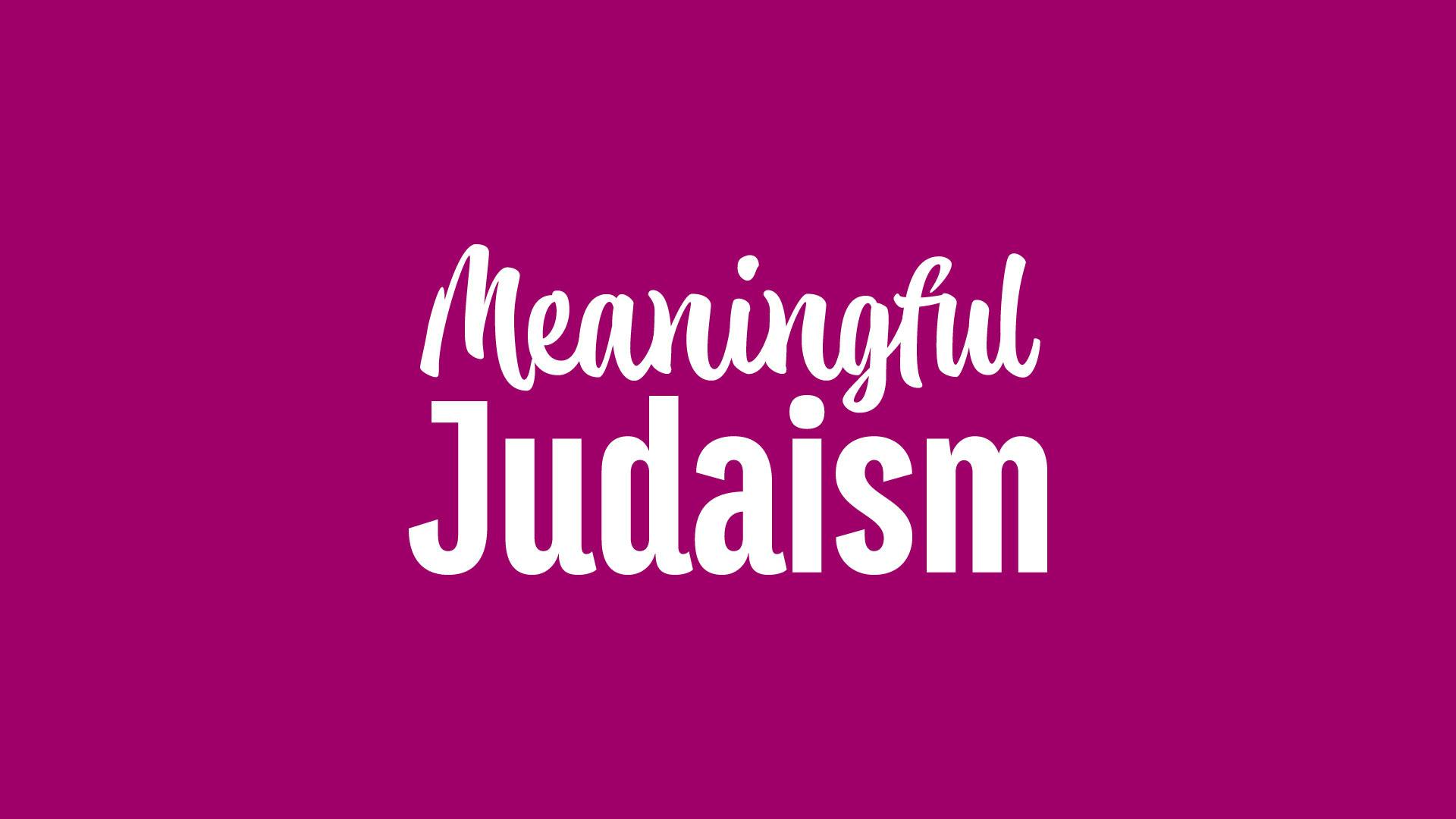
What’s Meaningful About Not Mixing Milk and Meat
In this episode of Meaningful Judaism, Imu Shalev and Beth Lesch delve into the surprising depth of the Torah’s dietary laws, particularly the restriction against mixing milk and meat. By examining these kashrut laws, along with the unusual context of prohibitions around Hametz, they uncover a powerful message. Our human drive to innovate and shape the world — symbolized by Hametz as a force of transformation and progress — can lead us to objectify creation and distance ourselves from divine connection. Kashrut, they suggest, teaches us to approach creation more mindfully, with the same sensitivity that God shows in creating us, guiding us away from the urge to dominate and control.
54 min

Israel’s Role as God’s Firstborn
Just as the Israelites begin their journey to freedom, God seems to interrupt the Exodus story with a command to consecrate every firstborn child and animal to Him. Why does God call attention to the firstborn in such a pivotal moment? In this video, Rabbi David Block and Imu Shalev explore the human drive to create and control—a drive that often tempts us to forget the divine source of all creation. Through the plague of Egypt’s firstborn, God highlights this human illusion, marking the very symbol of Egypt's legacy as a reminder of His ultimate role as Creator.
13 min

What Does God Have Against Chametz?
In this podcast episode, Imu Shalev and Rivky Stern dive into the fascinating prohibition of chametz in the offerings described in Parshat Tzav. Why does the Torah insist that the meal-offering be chametz-free all year round? What’s so problematic about chametz? Imu and Rivky dig into the surrounding context, exploring related laws like bikkurim and the prohibition against cooking a kid in its mother’s milk. Through these connections, they uncover a fresh perspective on the symbolism of chametz—not only on Passover, but throughout the year. Their insights reveal how the Torah guides us toward humility before God, particularly in moments of human creativity and expression.
Part 1 of 47 • 26 min

What’s So Meaningful About Counting the Omer?
In this episode of Into the Verse, Daniel Loewenstein and Malka Alweis explore the deeper meaning behind Sefirat HaOmer through surprising parallels to the laws of zav and zava. By analyzing these unexpected connections, Daniel suggests that counting the Omer serves as a way to counterbalance the human drive toward excess—a conscious practice of restraint and mindful growth.
Part 1 of 47 • 26 min
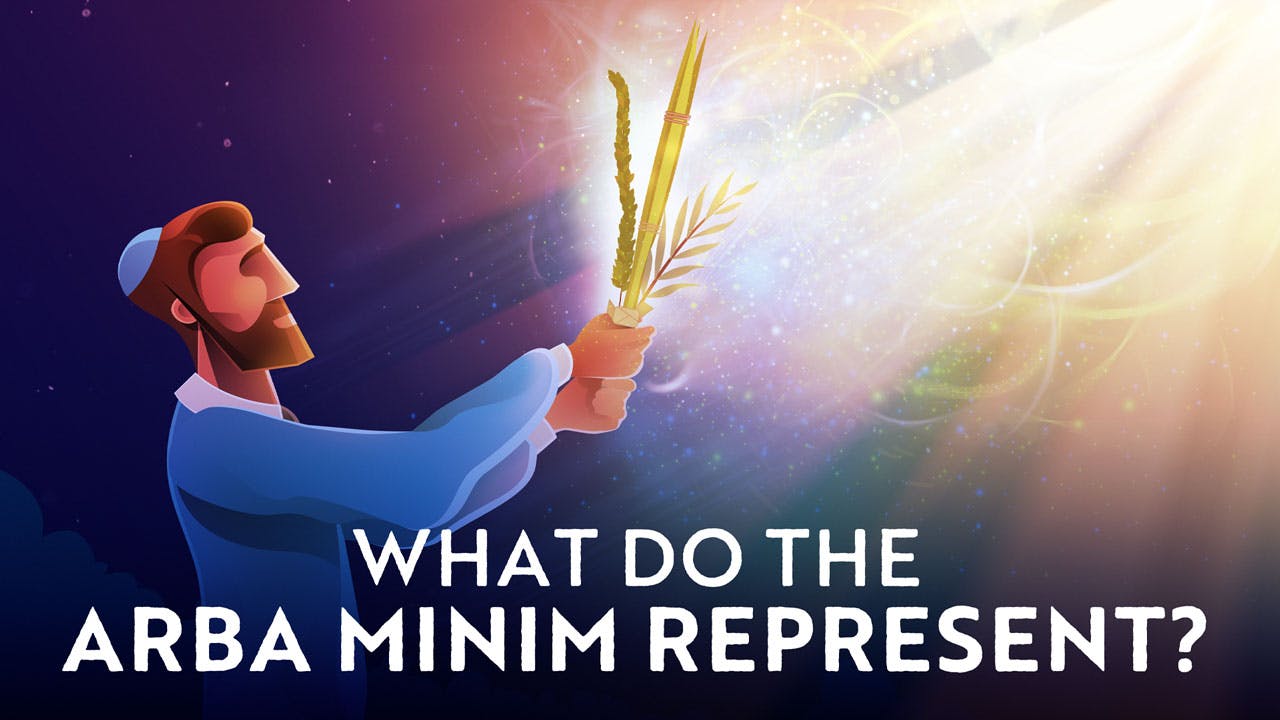
Finding the Source of Joy: What Do the Arba Minim Represent?
In this animated video, Ami Silver and Imu Shalev delve into the profound meaning behind the mysterious arba minim (Four Species) we take on Sukkot. They explore the Torah’s intriguing declaration that we will experience “joy” when we engage in this mitzvah. By drawing parallels to the Garden of Eden, Ami suggests that Sukkot offers a chance to reverse the consequences of the first sin—recognizing God during the harvest rather than stripping the world of its fruits like Adam and Eve.
Part 1 of 4 • 11 min
Respect Before Love
While Judaism often celebrates love as a powerful motivator for action, key narratives in the Torah reveal that it is respect that serves as the essential foundation for meaningful relationships. For instance, the Ten Commandments outline key principles that emphasize the importance of honoring others and establishing boundaries. The tragic story of Nadav and Avihu illustrates the dangers of love untempered by respect; their fervent desire to serve God leads to devastating consequences. Similarly, Lot’s hospitality, which mirrors Abraham’s kindness, ultimately results in chaos due to a lack of discernment. Through these examples, the Torah teaches that respect creates a framework within which love can thrive, suggesting that our highest expressions of love are grounded in a deep regard for others and the divine order.
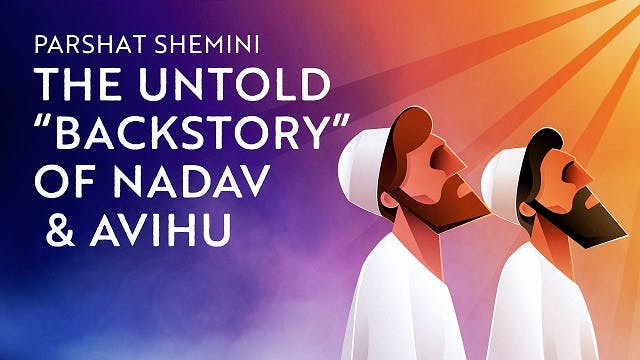
Making Sense Of Nadav And Avihu's Death
The death of Aaron’s sons is one of the most tragic and mystifying stories in the entire Torah. Two priests — seemingly spurred by their desire to serve God, by pure love for their Creator — are struck dead. Beth Lesch’s exploration of Nadav and Avihu’s “backstory” brings to light the perils of unbounded love.
16 min

Lot and Broken Kindness
We revere Abraham for the tremendous hospitality that he undertook for the visitors who approached his desert tent… but when his nephew Lot welcomes visitors to his Sodom home in the very next chapter, the story ends in disaster. Rabbi Fohrman and Ari Levisohn discuss Lot’s story as a tragedy of love given too freely.
29 min

What’s Meaningful About Niddah?
What is the meaning of the ‘niddah’ law? Why would God want to keep husbands and wives from expressing physical love for one another? Beth Lesch and Tikva Hecht follow the Torah’s clues from the laws of niddah in Leviticus to a story in the Book of Genesis, a journey which illuminates how boundaries, rather than limit love, can help it to flourish.
50 min

What is Holiness?
In Parshat Kedoshim, God makes a pretty ambitious ask of us: “Be holy!” The long list of commands that follows includes things like not lying or cheating, caring for the poor and pursuing social justice — and those do feel like “holy” ways of comporting ourselves. But some laws on the list may strike us as sort of conspicuous. “Don’t plant two different kinds of seeds in your field.” “Don’t eat a sacrifice on the third day.” What’s holy about that? Imu Shalev argues that our definition of “holiness” could benefit from a little tweaking… and that a proper understanding of boundaries lies at its heart.
15 min

Fear on the High Holidays
In this podcast on the 13 Attributes of Mercy, Rabbi Fohrman explores the fascinating balance between two divine qualities: compassion and emet—truth. While we usually think of compassion as pure kindness, Rabbi Fohrman challenges us to see how, in the 13 Attributes, it coexists with truth—a quality rooted in judgment. This connection invites us to rethink the nature of compassion, guiding us toward a deeper, authentic model of forgiveness for both others and ourselves.
1 hr & 18 min

S1 Ep. 1 The Elephant in the… Garden
We all know the story of the Garden of Eden: Adam, Eve, forbidden fruit, and the snake. But what if there’s a deeper layer to this ancient narrative? In Season One of A Book Like No Other, Rabbi Fohrman takes us on a journey through the Garden, focusing on the mysterious Tree of Life and the Tree of Knowledge of Good and Evil. Through his analysis, he uncovers powerful insights that transform our understanding of Torah, Judaism, and our relationship with God. Rabbi Fohrman reveals how the Garden story models a key principle: before claiming ownership, humanity must first appreciate and show reverence for God’s creation. This exploration invites us to see the Eden story—and our own spiritual lives—in a whole new light.
25 min
